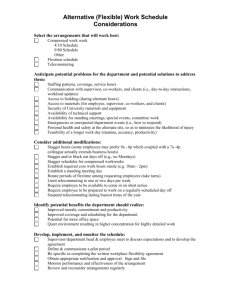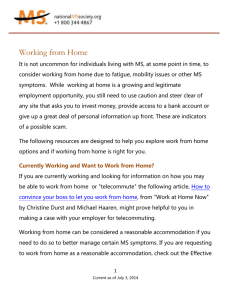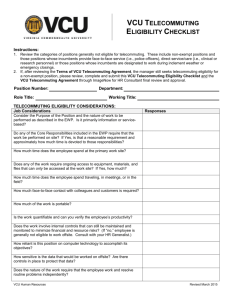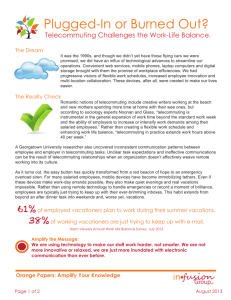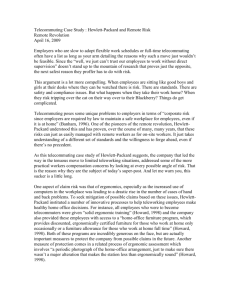Note to presenter: Customize for your company!
advertisement
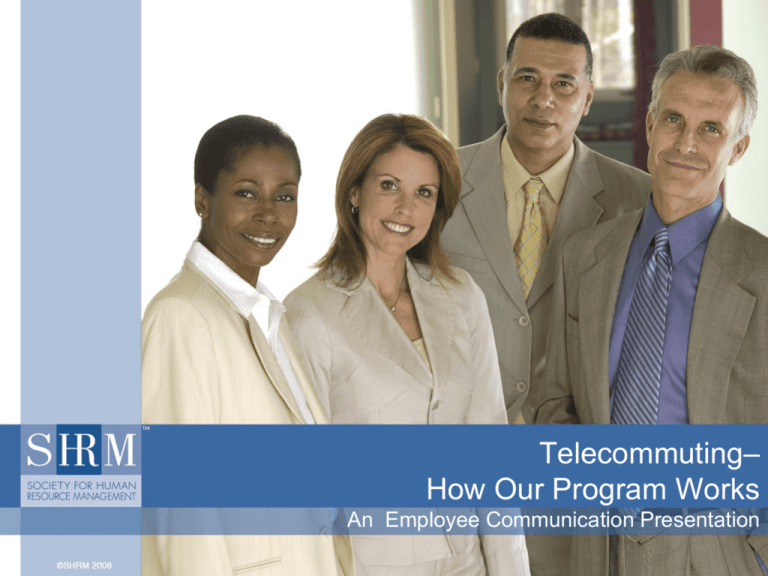
Telecommuting– How Our Program Works An Employee Communication Presentation Introduction Telecommuting or telework is becoming a popular alternative work arrangement as employers look for ways to respond to soaring operating costs, possible pandemics and other business continuity issues. Many employers implemented short-term telecommuting practices in response to the September 2001 terrorist attacks and to Hurricane Katrina. Other companies regard telecommuting as a way to proactively balance their business operating needs with employee work-life needs. ©SHRM 2008 2 Introduction (cont’d) In light of these economically challenging times and as technology has evolved, more employers are considering starting or expanding telework arrangements. A survey conducted by World at Work on telecommuting practices found that the number of U.S. telecommuters increased 39 percent, from 12.4 million in 2006 to 17.2 million in 2008. This sample presentation is intended for presentation to all employees. It is designed to be presented by an individual who has knowledge of the employer’s telecommuting programs. This is a sample presentation that must be customized to include and match the employer’s own telecommuting program and policy. ©SHRM 2008 3 Agenda During this meeting, we will review: • • • • • • How our policy defines telecommuting. Benefits of telecommuting to the employee. Benefits of telecommuting to the company. Criteria for selecting telecommuting employees. Telecommuting application process. Tips on being an effective telecommuter. ©SHRM 2008 4 How Our Policy Defines Telecommuting • • • (Note to presenter: Customize for your company!) Here at [Company Name], we define telecommuting as [fill in your own company definition and description of the program. The description should include information about working from either an office in their home or a telework center which is different than the company headquarters or other company facility]. We may use the word telework to describe the telecommuting work arrangement during our discussion today and in the company policy. Today you will receive your copy of our new telecommuting policy. Be sure to add this policy to your copy of the employee handbook. If you do not have a copy of the employee handbook, you can obtain an electronic copy on the company intranet. Look under [insert your company title and other identifying information]. ©SHRM 2008 5 Benefits of Telecommuting to the Employee Survey data has indicated employees who telecommute benefit with • • • • • Greater productivity. Increased job satisfaction. Less stress and better health. Lower commuting costs. More flexibility to balance and manage work and home responsibilities. ©SHRM 2008 6 Benefits of Telecommuting to the Company Survey data shows that companies benefit from • Increased productivity. • Increased job satisfaction, leading to increased employee retention and lower recruitment costs. • Relocation cost savings. • Reduction of office space and corresponding expenses. ©SHRM 2008 7 Criteria for Telecommuting (Note to presenter: Customize for your company!) According to our policy, the selection criteria for telecommuting employees include employees who: • Have demonstrated a thorough and productive understanding of their job, which for some positions can take up to 6 months of continuous employment with our company. • Have demonstrated a consistent and acceptable level of productivity and quality by receiving a “meets” or “exceeds” performance evaluation within 3-6 months of their telecommuting request. • Demonstrate the ability to work independently with minimal levels of supervision. • Perform job duties which are not location-specific (e.g., receptionists cannot be telecommuters). ©SHRM 2008 8 Criteria for Telecommuting (cont’d) • • • • Have a location with a dedicated workspace free from distractions. Working parents or those who have caretaking responsibilities and will be working from a home office must have viable childcare or caretaking arrangements. Telecommuting should not be considered a substitute for these arrangements. If there are numerous telecommuting requests within a department, seniority may be used as a determining factor. Telecommuting may be used in response to modified work, light-duty assignments, or requests for reasonable religious and/or ADA accommodations. ©SHRM 2008 9 Questions? Comments? ©SHRM 2008 10 Telecommuting Application Process (Note to presenter: Customize for your company!) • • • • • All requests to telecommute must be submitted in writing to your immediate supervisor. An explanation as to why you will be an effective telecommuter must accompany all requests. Allow 2-3 weeks for management to review requests. Immediate supervisors will review and recommend further action. HR will notify employees of decision. ©SHRM 2008 11 Questions? Comments? ©SHRM 2008 12 Tips on Being an Effective Telecommuter • Create a productive workspace free from household distractions if you are working from home. • Verify you know how to operate all company-provided equipment and that you have alternate plans should you encounter problems. (The company provides telecommuters with computer equipment and will reimburse reasonable Internet access expenses.) • Use company-provided communication tools to keep in contact with your manager and colleagues on a regular basis to manage feelings of isolation. • Schedule in advance with your manager the day(s) you will be in the office to verify that space is available. ©SHRM 2008 13 Questions? Comments? ©SHRM 2008 14 Summary • Telecommuting is becoming a popular alternative work option. • It can be a win/win solution for both employers and employees. • Our company telecommuting program will start [insert date here]. • Employees must apply to participate in our company telecommuting program. • Telecommuting is not a suitable option for all jobs or all employees. • More information and our company policy can be found on the company intranet. ©SHRM 2008 15 Meeting Evaluation Please be sure to complete and leave the evaluation sheet you received with your handouts. Thank you for your attention and interest! ©SHRM 2008 16
